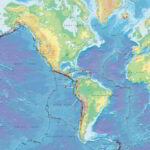This is a wonderful and well-taught free online Earth Science course, offered by WHRO Education. To get access to the course files for free, you will need to complete this form. The course conveys and teaches the understanding of Earth’s complex systems and its place in the universe and includes topics in geology, oceanography, meteorology, and astronomy. In this Earth Science course, the student learns about Earth’s systems and how they interact with one another through inter-activities, videos, collaborative discussions, hands-on applications, scientific investigations, and real-world projects. You can also take a look at all of our Earth Science educational pages here and a recent post for 4 Free Middle School Earth Science Lesson Units.
Module 1: What is Earth Science?
- Module Overview
- The Branches of Earth Science
- Scientific Investigation
- Measurement
- Module Summary
- Module Authentic Assessment
Mapping
- Module Overview
- Mapping the World
- Analyzing Maps
- Topographic Maps
- Satellite Imagery and the Global Positioning System
- Module Summary
- Module Authentic Assessment
Astronomy – The Universe
- Module Overview
- Cosmology
- Galaxies and the Milky Way
- Stellar Evolution and Classification
- The Electromagnetic Spectrum and the Doppler Effect
- Telescopes and Other Tools
- Early Astronomers
- Modern Astronomy
- Module Summary
- Module Authentic Assessment
Astronomy – The Solar System
- Module Overview
- The Formation of the Solar System
- The Sun
- The Terrestrial Planets
- The Jovian Planets
- Other Objects in the Solar System
- Earth’s Moon and Lunar Phases
- Sun, Earth, and Moon Systems
- Module Summary
- Module Authentic Assessment
Minerals
- Module Overview
- Matter
- Minerals
- Identification of Minerals
- Module Summary
- Module Authentic Assessment
Rocks
- Module Overview
- Igneous Rocks
- Sedimentary Rocks
- Metamorphic Rocks
- The Rock Cycle
- Module Summary
- Module Authentic Assessment
Plate Tectonics and Earth’s Structure
- Module Overview
- Earth’s Structure
- Plate Tectonics
- Volcanoes
- Earthquakes
- Module Summary
- Module Authentic Assessment
Weathering, Erosion, and Groundwater
- Module Overview
- Weathering
- Karst Topography
- Soils
- Erosion and Deposition
- Surface Water
- Groundwater
- Module Summary
- Module Authentic Assessment
Earth’s History
- Module Overview
- Relative Dating
- Radiometric Dating
- Geologic Time
- Fossils
- Module Summary
- Module Authentic Assessment
Resources and Virginia Geology
- Module Overview
- Renewable and Nonrenewable Resources
- Fossil Fuel Energy Resources
- Alternative Energy Resources
- Virginia Geology and Resources
- Virginia Watersheds and the Chesapeake Bay
- Module Summary
- Module Authentic Assessment
Meteorology
- Module Overview
- Earth’s Atmosphere
- Clouds and Precipitation
- Weather and Climate
- Weather Observations
- Interpreting Weather Maps
- Severe Weather
- Changes in the Atmosphere
- Module Summary
- Module Authentic Assessment
Oceanography
- Module Overview
- The Blue Planet
- Ocean Movement – Waves and Tides
- Salinity and Ocean Circulation
- Ocean Geomorphology
- Ocean Life
- Environmental, Economic, and Public Policy and the Oceans
- Module Summary
- Module Authentic Assessment
Google Earth
This course uses the Google Earth application. You will need to download and use this application throughout the course. Click on the link below for more information about installing the Google Earth™ application.
Scientific Investigation Reports
Each scientific investigation uses a consistent format that follows the scientific process. As you complete each scientific investigation, you will maintain a scientific investigation report. This report will be a document in which you will need to make predictions, record data, analyze any data collected, and form conclusions about the scientific investigation.
You may see the following terms in a scientific investigation:
- Title – the name of the scientific investigation
- Introduction – any background information from the topic that you will need to know before you begin the scientific investigation
- Objectives – identified learning goals for the scientific investigation
- Hypothesis – a prediction that you formulate based on your prior knowledge and by reading the scientific investigation’s procedure
- Required Simulation – information about a simulation used in a scientific investigation
Equipment and Materials – a list of any special equipment or materials that you will need to perform the scientific investigation - Procedure and Data Collection – a set of instructions provided to you so that you know how to conduct the scientific investigation; the procedure will prompt you when you need to record data
- Data – a location for you to record your observations and measurements from the scientific investigation
- Data Analysis – a list of questions or prompts that assist you with analyzing the data that you collect during the scientific investigation
- Conclusion – a summary of the findings of the scientific investigation; accepts or refute any hypotheses made at the beginning of the investigation
- Experimental Sources of Error – a list of any sources of error that may occur during the scientific investigatio
– love learning -your best ed lessons guide, Scott





Great article post. Really thank you! Really Cool.